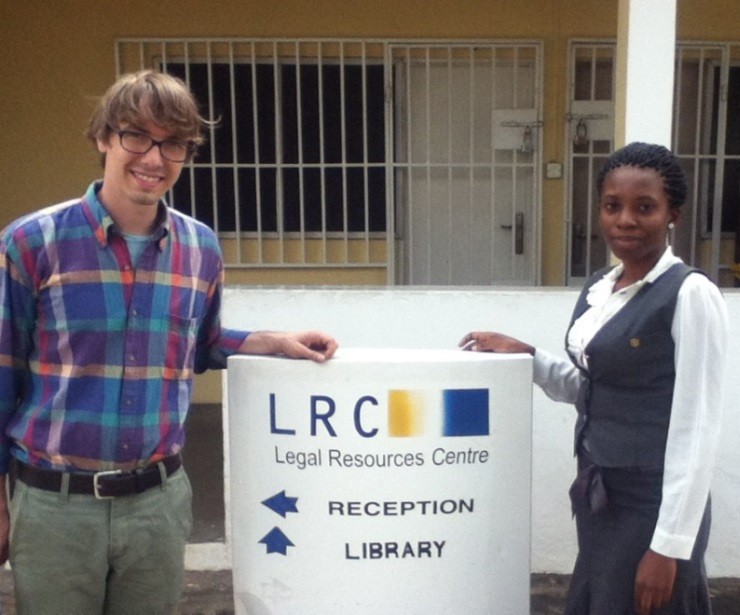By: Jim Ransdell
Jim Ransdell, 3L, interned at Legal Resources Centre in Accra, Ghana during the Summer of 2014 as part of Washington University School of Law’s Global Public Interest Law Internships. This is the third in a series of posts by Jim where he shares his experiences and observations working in a foreign legal system. Read his first post on legal education in Ghana, and his second on Ghana’s High Court.
 While working with the Legal Resources Centre, I had the opportunity to observe criminal trials and read local news articles relaying criminal sentences. On one end of the spectrum, I witnessed a judge sentence two people convicted of $8,000 (USD) property damage to a day in jail plus a $1,500 fine. On the other end, Ghana’s Daily Graphic reported a story about a pickpocket who stole two cell phones and $40 after threatening, but not harming, his victim. He received 60 years in prison.[1] Criminal sentencing in Ghana follows guidelines in the Criminal and Other Offences (Procedure) Act, 1960. However, particularly where guidelines specify minimum sentences but no maximum, sentencing practices can vary widely. This can lead to abuses of discretion, such as refusing suspects’ bail as punishment. The Ghana Bar Association would go further, and has recently decried a lack of trust in the legal system and accused the judiciary of outright corruption.
While working with the Legal Resources Centre, I had the opportunity to observe criminal trials and read local news articles relaying criminal sentences. On one end of the spectrum, I witnessed a judge sentence two people convicted of $8,000 (USD) property damage to a day in jail plus a $1,500 fine. On the other end, Ghana’s Daily Graphic reported a story about a pickpocket who stole two cell phones and $40 after threatening, but not harming, his victim. He received 60 years in prison.[1] Criminal sentencing in Ghana follows guidelines in the Criminal and Other Offences (Procedure) Act, 1960. However, particularly where guidelines specify minimum sentences but no maximum, sentencing practices can vary widely. This can lead to abuses of discretion, such as refusing suspects’ bail as punishment. The Ghana Bar Association would go further, and has recently decried a lack of trust in the legal system and accused the judiciary of outright corruption.
Criminal sentencing was among the issues addressed by Ghana’s Constitutional Reform Committee (CRC). The CRC’s 2011 interim report to the President advocated reform, but no concrete steps have been taken and the issue remains open. The CRC was created under President Mills and began work in January 2010. With a two-year mandate, the CRC was tasked with conducting research and soliciting Ghanaians’ input regarding prudent amendments to the 1992 Constitution. Ultimately, the CRC solicited over 89,000 formal submissions and several million informal submissions, which were then used in crafting the recommendations formally submitted to the President.[2]
As part of a broader inquiry into Ghana’s Human Rights regime, the CRC tackled issues concerning the Right to a Fair Trial, and Criminal Sentencing. On the issue of sentencing, the CRC recommended the following Legislative action:
- Criminal and Other Offences (Procedure) Act, 1960 should be amended to institute the option of communal service (as opposed to imprisonment) for certain categories of offences.[3]
- The current penal legislative framework should be reviewed and streamlined to incorporate well-studied and defined sentencing guidelines and procedures so as to ensure uniformity in sentencing, as well as to favor the progressive prescription of non-custodial sentences, especially for minor offences.[4]
Thematically, in assessing Ghana’s criminal justice system, the CRC repeatedly mentioned the goal of reducing prison congestion. After submitting these recommendations to the President in Dec. 2011, the CRC advocated the establishment of a non-partisan Technical Committee to assist implementing the CRC’s recommendations. In light of the death of sitting President Mills as well as the looming 2012 Presidential election and the distraction that would prove to legislators and media personnel alike, the CRC suggested a referendum be held in 2013 before legislative taking steps.[5] To date, the changes advocated by the CRC have yet to be implemented, though the Ghana Bar Association passed a resolution in 2014 advocating an “overhaul” of Ghana’s criminal justice system.

Washington University law students Rachael McClain and Jim Ransdell with Wash U alum Edgar Mason, who works with USAID in Ghana.
[1] Kwadwo Baggoe Donkor, “Man jailed 60 years for stealing phones, money,” 30 Apr. 2014, Daily Graphic, p. 26. Defendant threatened his victim with rape and murder. The victim was physically unharmed, and defendant pled guilty on all charges.
[2] See Pages 1-14, Report of the Constitution Review Commission, Dec. 2011.
[3] Ch. 13, ¶ 187, Report of the Constitution Review Commission, Dec. 2011.
[4] Ch. 13, ¶ 188, Report of the Constitution Review Commission, Dec. 2011. This recommendation was also made earlier in the CRC’s report, in conjunction with their inquiry into the duration of civil and criminal trials, Ch. 6, ¶48(d), Report of the Constitution Review Commission, Dec. 2011.
[5] Ch. 15, Report of the Constitution Review Commission, Dec. 2011.
